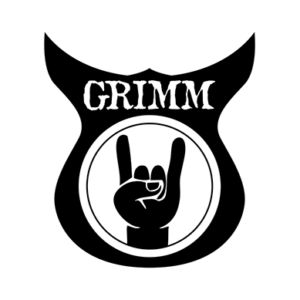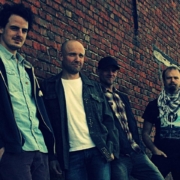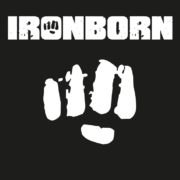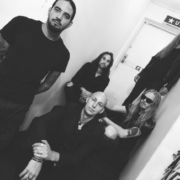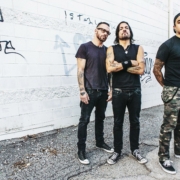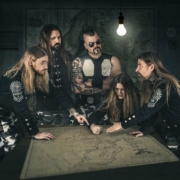When prompted about contemporary American bands that combine the doom of Black Sabbath with the melodic intricacy of Thin Lizzy, one usually thinks about classy Southern groups like Baroness, Valkyrie, or The Sword. It is often forgotten that the North of the United States also harbours some quality contenders in that field. Together with Slough Feg and Pharaoh, Pennsylvania’s Argus is one of the standard bearers of the trad metal revival which has been in full swing since the turn of the decade. Argus’s style is less sludgy than that of its Southern cousins. The band’s muscular riffs and moody rhythms call to mind the image of a dire wolf trudging menacingly across the steppe-tundra. It may not be the biggest beast to ever walk the earth, but its design and demeanour make perfect sense from an evolutionary point of view.
So far, the quintet has released three full-length albums, the last two with the reputable Italian label Cruz Del Sur. Each record features iconic artwork by US artist Brad Moore. Grimm spoke with Argus during their recent European tour, which took the band from Hamburg to Dublin between 4 and 13 March 2016. This was a great chance to talk about the group’s song writing routines, recent line-up changes and the upcoming album. Sitting cosily in the back of their touring van, four of the five Argus members were more than ready to answer all of our questions.
When did Argus come together as a band?
Kevin Latchaw: The band got started in 2004, when I was in my late twenties. Erik Johnson and I had been in a few different bands together, but we just kept breaking up. It didn’t look like we were going anywhere. At the time, I was kind of in a funk. My dad had passed away and Erik was trying to get us playing again. So Erik and I discussed naming a band Argus, after the all-seeing creature from Greek mythology. We started jamming with Mike Wisniewski and that was the foundation of Argus right there. Just three friends playing music.
Clearly, the band has evolved a lot since those days.
Kevin: Our friend Jason Mucio joined on guitar in 2005, around the time Erik left for the first time. Since Erik was also the band’s original singer, he was replaced by Brian, who previously lent his voice to the doom metal band Penance. When Mike quit the band in 2008, Erik returned to the fold, shortly before the release of our first album. Two more albums followed, on which we refined the quintessential Argus sound.
How would you describe this current sound?
Kevin: The best way to describe it is just a perfect mix of all our influences. We have a solid foundation in classic metal. There’s an aspect of doom metal, bits of thrash . . . At the same time, there’s a uniqueness to it. That’s because Jason ‒ one of our primary songwriters ‒ doesn’t listen to music much. Obviously he had his influences growing up but he’s not really aware of any bands (chuckles). As a result, he brings a unique perspective to our songwriting process.
Brian Balich: Of course there’s certain bands that we all love like Thin Lizzy, but we try to maintain an approach that is distinctively our own. We just know what sounds like us and what doesn’t. Hence we’re able to keep a foot in traditional metal without sounding like we’re just aping some of the older bands like Iron Maiden or Candlemass.
Do you try to distance yourselves from the whole retro business?
Dave Watson: I wouldn’t mind if the retro community enjoyed us, but the goal was never to present a throwback for the sake of nostalgia. It’s not about the white high tops, the tight jeans or the vest. We have a traditional sound, but not for the sake of sounding traditional. It’s not like we said: “okay, let’s be a modern-day Exodus or Destruction”, like in the early 2000s when that new wave of thrash was coming up.
Perhaps that’s one of the reasons why you kick so much ass live. Your music doesn’t feel manufactured at all.
Dave: Argus is like a melting pot of our influences. We do what comes naturally. We don’t say: “this band is getting big, so let’s try to sound like that”. When the whole retro-occult movement took off a couple of years ago, a lot of bands were coming out with skulls and candles. But I wonder if these bands were always like that. Our output doesn’t feel manufactured because the band has been going at it since 2004. There’s a certain sound that comes from that.
Still, when the band started out, it had a somewhat different sound, closer to stoner rock/metal.
Brian: It’s not like we ever sat around and decided to change our style. Honestly, it was just a natural occurrence. I joined the band around the time when Erik was moving and they were out of a singer. Erik and I sing completely differently. He is a better fit for the stoner stuff. I have more of a metal voice, so we had to tailor the new songs to that.
Kevin: We were very excited when we got Brian. That really opened up a whole new realm of possibilities for our song writing. All of a sudden, we could play more melodic stuff. Bending time and Faustus were the first couple of songs to define this new direction.
Brian: We never made a conscious decision to eschew modern sounds. We do like some modern bands such as Baroness or Mastodon. But when we play, it has to sound like us. It’s just a matter of knowing what our strengths are.
That’s great to hear. Many fans are so hung up on labels and a desire to create in-groups which define themselves against outsiders. But when you actually take the time to talk to the bands themselves, it seems that stylistic decisions are based on more pragmatic considerations.
Brian: Before we finalize a song, it has to go through a filter of everyone in the band. Usually, Jason or Dave brings up the bulk the riffs and then we all put our marks on it. Everything has to go through that process. We have a way of weeding out what we don’t like.
Kevin: Our approach is one of the reasons we’ve come up with such a variety of songs. Since we stride all of these different subgenres, we are able to respond to requests. If the crowd is really into doom metal, we can play some of our moodier stuff (like 42-7-29).
Recently the band morphed some more. Dave Watson became the second guitar player when Erik left Argus for the second time. Of course, Dave is not that new since he already produced the last two albums. So I am really excited to hear from Justin Campbell, who replaced the band’s long-time bass player Andy Ramage.
Justin Campbell: In terms of song writing, I try to focus on the subtle things. Sometimes I contribute little parts here and there, just to make the transitions between riffs more interesting. Throughout my playing career, I’ve been someone that listens to what somebody has composed before making suggestions for rearrangement. Adding a drum fill, for example, or just to do a rest. That’s my aspect.
Andy and I were in a punk band together. When contributing bass lines to the new Argus songs, I consciously try come up with something that fits with Andy’s distinctive style. In general, I don’t want to overdo things. I don’t like it when my bass sounds too muddy. But every now and then, I want to do a crazy run. This may present a few challenges in a live context. My tendency to move around on stage doesn’t make matters any easier (laughs).
You mentioned a background in punk rock. What role does punk play in the formative years of a metal musician?
Dave: When I was growing up, the metal mainstream in America was defined by the likes of Limb Bizkit and Korn. It was hard for me to identify with that. Punk offered something different. It was fast and darker sounding, especially some of the UK stuff (like GBH, The Exploited or Conflict). Eventually, I grew out of it. I got my first guitar lessons from a metal guitar player. Learning to play Black Sabbath was like a revelation to me.
Brian: I grew up in the 1980s, during the hair metal boom. Kids are always looking for music that is rebellious, but metal is often a larger-than-life kind of thing. It’s not as easy to feel a part of it. Punk is more accessible in that way. I was never a big punk fan, but I like the idea that you don’t have to change who you are. In the 1980s, you couldn’t play metal unless you were in a thrash band or a more extreme outfit. You had to have a certain look. I was in bands, but I didn’t have that look. In metal, it’s always a little bit harder to break down that door.
You pay great attention to the quality of your lyrics. Are there other bands that you admire for doing this?
Brian: I like a lot of different lyricists for different reasons. You can admire a band like Iron Maiden that delves into history, but then you have someone like Dave Wyndorf who writes lyrics in such a visual way. I may not really know what he is talking about, but he paints such an intriguing picture. Then there’s guys that sing about everyday experiences. Phil Lynott was such a great storyteller. Ian Gillan and Steven Tyler have also surprised me with some of their clever lines.
Kevin: I’m big on lyrics. I think the quality of lyrics and vocals can really make or break a band. If Brian was ever to come up with sub-standard lyrics, it wouldn’t fly past me (laughs).
Do you feel it’s important to have the right mix of themes for the upcoming album?
Brian: We usually get the music first. Then I take the track with me to figure out what kind of mood it suggests to me. I start humming along, basing my vocal line on what I’m feeling from the song. From there, I fit the lyrics to those feelings. So in the end, it all depends. If we write ten epic-sounding tracks, then I feel a compulsion to get the books out. But if we come up with songs that sound really emotional to me, I go for a more personal approach.
So all of these inspirations are kind of hovering in your head. They need the music to give them a proper ground . . . To wrap up this interview, when are we going to see you guys performing in Belgium?
Justin: For this tour, we talked about doing a date in Belgium. It’s only a matter of time before we make it happen. After we played Roadburn last year, Jason and his girlfriend actually went to visit Belgium, because it’s such a beautiful place.
Brian: I’ve played in Ghent before with Penance. We had a great gig there. Belgium, Austria and Switzerland always come up when we talk about touring. Italy is also high on that list.
Justin: I’m pretty sure that if we had contacts in every country within the European Union, we would play there. The UK is probably an exception, unless someone can help us out with the visa requirements. I personally would love to play in Scotland, because of my Scottish (and Irish) heritage. After playing Ireland and Roadburn last year, it was mildly depressing to return to the US touring circuit. In the States, ninety-five percent of promoters treats you like a commodity. Your band has to make money for them. Here in Europe, I feel more respected as an artist.
Kevin: All the promoters we’ve worked with in Europe, guys like Walter (Roadburn), Mark (Doomsower), Wolf-Rüdiger (Hell over Hammaburg), Oliver (Hammer of Doom) . . . they make you feel welcome.
Brian: Promoters like Marc (Dublin), James (Belfast), Tall John (Limerick) and Sebastian (Nurnberg) do shows all the time and you just know they love the music. There seems to be a division between crowds and promoters in the US and crowds and promoters over here. I don’t want to talk shit on US fan bases. We appreciate all of our American fans, but there is definitely a difference when you come over to Europe.
And we like Americans when they bring us great music. Just to let you know . . . there’s no bad blood between us.
